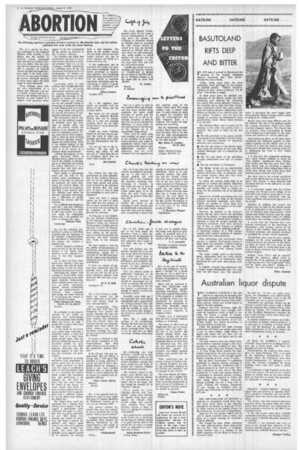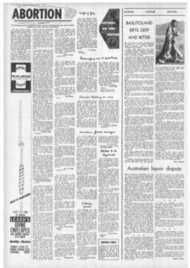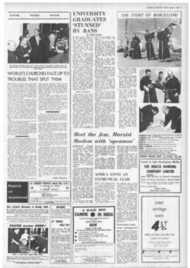Page 2, 5th August 1966
Page 2

Report an error
Noticed an error on this page?If you've noticed an error in this article please click here to report it.
Tags
Share
Related articles
Doctors' Guild Attacks Poll
Why We Failed To Stop The Abortion Act
N Ireland Survey Supports Abortion
Cardinal To Press Hewitt Over Abortion Limit
Most British Women Want Abortion Law Tightened Up, New...
ABORTION discusses leg,
priest the The CATHOL
three experts one put forward their a leading doctor
argument, &rot
Sir,—In a survey on abortion published by the National Opinion Polls recently it was shown that the number of Catholic women questioned who had had an induced abortion was higher than the average for the nation as a whole, and a majority of Catholic women thought that legal abortion ought to be made easier. Seventy one per cent of Catholic women favoured abortion in those cases where the baby might be born deformed.
These findings agree with my own observations as a doctor and, although I am not a Catholic, I feel I will be expressing the feelings of quite a number of your readers if I suggest a few questions which
appear to be left unanswered by the articles on abortion in the CATHOLIC HERALD.
No mention was made that spontaneous abortion is a cornmon process, but there is medical evidence that it is an exceedingly valuable mechanism in excluding some of the not uncommon biological errors of development. As doctors extend natural processes in many other ways why not in abortion?
Conversely, there is now evidence that Thalidomide may have acted by preventing spontaneous abortions and not by causing abnormalities. If we apply the principle of the sanctity of human life to the embryo without any reserve, are we not ethically bound to encourage all pregnant mothers to take Thalidomide or to look for a drug which will prevent the natural elimination of congenitally abnormal embryos?
The anonymous doctor who wrote on the medical aspects of abortion notes the principle of double effect and that the Church teaches the licitness of an abortion in the case of a cancerous uterus. Today most doctors find it impossible to draw an exact dividing line between physical, psychological and social illness. What if the mother instead of the womb is diseased? What if the child is to be reared in a diseased social environment?
Catholic theologians, for instance Professor Healy in Medical Ethics, allow an abortion if the embryo is developing in an abnormal site outside the uterus. However, it is a medical fact that such pregnancies can go to term.
Their chance is exceedingly small and the risks to the mother great, nevertheless it seems to me that in allowing an operation for tuba! pregnancy the Church denies the possibility of life to an embryo and that it has entered upon that difficult road where we abandon absolutes and recognise a difference of quality between the embyro and the newborn.
It is a difficult and dangerous road but I feel that Catholics and non-Catholics have much to offer one another in a common quest for responsible action and I am grateful for space to discuss this topic. Malcolm Potts Cambridge.
Sir,—In this abortion controversy it seems to have been forgotten that the signature of the "patient" is required before an anaesthetic is administered. The patient, too, requires a hospital bed.
I cannot imagine a situation when all risk to the life of the mother is nil. Death from abortion is not unheard of— even in the best equipped hospital.
Let us place all these facts before the "patient"—give her the choice—she will no doubt allow nature to take its course and delay meeting her Creator.
Discussing the subject with a group of I 8-year-olds—many would be surprised at the intelligent solutions forthcoming. These student nurses have seen t h e so called "psychiatric patient" recover wonderfully when her embarrassment is removed. Their sympathy and energy are better directed to encouraging the mother to cope with her problem.
(Miss) Margaret M. Nade,
S.R.N., R.N.T. Preston.
Sir,—Further to the doctor's remarks in the article on abortion, that non-Catholics find our argument from double effect too clever by half, I would like to agree with them for these reasons:
(1) The death of the foetus must result from removing a cancerous womb, a burst fallopian tube or a baby from inside another baby. That one does not intend the known and inevitable results of one's actions is just not true. That intention decreases with decreasing degrees of risk, but here are certainties, not probabilities.
(2) All operations involving mutilation must accomplish a greater good than the loss of the organ exercised. In these cases the organ is sacrificed in order to save the mother's life, i.e., it is precisely this motive which renders the mutilation licit, and performing it an innocent act. Yet since we know that this must involve the death of the foetus, we assert exactly that which we want to deny, namely that saving the mother's life is a greater good and a sufficient motive for an act which must destroy the baby's life.
The Popes have used this argument, but I believe their advisers were misled. I beg to suggest a justification more consistent and quite as orthodox. Life is a good, and death an evil. This theme runs through the whole of Scripture, and from it derives the mother's and baby's equal right to life. But not to operate in these cases means two deaths, two evils, and the principle to be applied should be to minimise the damage from a bad situation. The death of the mother cannot save the baby, and we save her simply because she can be saved, because one death is a lesser evil than two.
If this explanation can be accepted, and makes our position more intelligible, there is surely advantage in suppressing sophistry and by-passing questions about the baby's soul. Can we afford to maintain arguments off-putting and unconvincing to others of goodwill. unreal, unnecessary and self-contradictory?
Eileen Landray London, W.9.
Sir, — We applaud your article on abortion and the efforts of Mr. Dunn and the Catholic M.P.s.
But words are not enough against the Abortion Reform Society who try to remedy what is a real and pressing problem. Have we no other answer than to say to them that we disagree?
Could not every Catholic family do all they can to support the work of child care societies and those who work for the handicapped and deformed?
Can we not say to the reformers, "Do not seek to destroy that child; we will care for it"? Only then can we as Christians show that we really value human life.
Jill Kelbrick York.
Sir,—Thank you, and congratulations on your presentation in the CATHOLIC HERALD, July 22, of the medical argument, legal aspects and moral issues involved in the Abortion Law Reform Bill, but why have we had to wait so long for something so lucid and informative?
There has been a strange silence on the part of those who hold that the sanctity of life is being attacked, but not so by those who are calling for an extension of the legal grounds for abortion.
As long ago as last September the National Conferences of the National Association of Women's Clubs, the National Townswomen's Guilds and the National Council of Women, all carried unanimously resolutions calling on the government to extend the grounds for abortion. All were reported very freely in the national press.
We have looked in vain for any public pronouncement of resolutions carried by Catholic organisations calling for a rejection of this Bill and quoting the cogent and unassailable arguments given by your three contributors.
Is there any chance of getting these arguments into the national press, and quickly? It's not too late yet for us to make Christian opinion vocal about this Bill, but time is running out.
M. E. D. Duff Liverpool, 18.
Sin—I find it hard to understand the reasons for the violent objections to the Abortion Law reform made by your correspondents.
God commanded, "Thou shalt not kill" Full Stop. No exceptions were named; but society, through the ages has made its own expedient exceptions—without any objections from the Church. Since the Catholic Church was founded, people have been killed for many reasons — e.g., heresy, treachery, stealing, etc., without any outcry from the Catholic Church.
If society is allowed to pick and choose exceptions to this Commandment then what valid objection can be made to this generation picking abortion?
If the Church will state unequivocally that all killing is wrong, then I will agree that abortion is wrong, otherwise I cannot see that to kill a twomonth foetus by dropping a bomb is any more morally justified than to destroy that foetus to avoid risking the life or reason of a mother with dependent children,
(Mrs.) Norah Martin Wok ing, Surrey.
Sir,--T was appalled and dismayed to read in your paper that only 14 Catholic Members of Parliament formed up to vote on the Abortion Bill.
Any serious reasons excepted, why were they absent? Is one to conclude that, in this matter, "Silence gives consent"?
I suggest that these Members re-examine their reasons for offering themselves as our representatives, and return to work where Less would be expected of them.
"Disillusioned" Purley.
blog comments powered by Disqus









